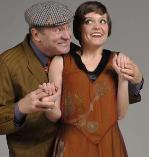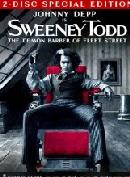HOME PAGE
SITE GUIDE
SEARCH
ADVERTISING AT CURTAINUP
REVIEWS
FEATURES
NEWS
Etcetera and
Short Term Listings
LISTINGS
Broadway
Off-Broadway
NYC Restaurants
BOOKS and CDs
OTHER PLACES
Berkshires
London
California
New Jersey
Philadelphia
Elsewhere
QUOTES
TKTS
PLAYWRIGHTS' ALBUMS
LETTERS TO EDITOR
FILM
LINKS
MISCELLANEOUS
Free Updates
Masthead
Writing for Us
A CurtainUp San Francisco Review
Lady, Be Good!
|
There's no sensation like syncopation.—Susie
|

Andrew Boyer and Rena Wilson
|
One of those fifty was George's own brother, Ira. It may have been George's personal magnetism and kinetic compositions that most palpably ushered in a new era of music in the 1920s and 1930s, but he didn't do it alone, and Ira (who died in 1983 at the age of 86) would outlive his brother and continue to contribute to the legacy of American song for decades to come.
Although the brothers collaborated on more than a dozen Broadway shows, their first effort was the screwball comedy Lady, Be Good!, which kicks off 42nd Street Moon's celebration of Ira's work. Sheed called the show, which opened on Broadway in 1924, "simpleminded." Its book, bursting with non sequiturs and odd plot (and song) twists, more than backs up that claim—but it nonetheless represents an important stop along the Gershwins' path to prominence.
The show's music springs from the collaboration of two brothers, and the sibling connection extends to the two main characters, Susie and Dick Travers (originally played by real-life siblings Fred and Adele Astaire). Months behind on rent, the close-knit brother and sister are thrown out into the street, where (what else?) they break into their first song-and-dance, the plucky "Hang on to Me." Their quest for financial solvency leads Susie and Dick from the wealthy city homes of friends to a lavish country hotel.
With the permission of the Gershwin estate, director Chris Smith has moved the setting to the West Coast—Nob Hill steps in for Rhode Island, and Napa Valley substitutes for Connecticut. But other than a few visual winks, including a street sign at the intersection of Clay and Mason Streets, the switcheroo does little to elevate the lightweight plot. And the story becomes almost exhaustingly ridiculous. Rather than marry Shirley, the (not-so-rich) girl he loves, Dick sets off in pursuit of the snide millionaire Josephine Vanderwater, while Susie, in cahoots with enterprising attorney Watty Watkins, masquerades as a Mexican heiress in the hopes of claiming a million-dollar estate.
Although Lady, Be Good! reflects an earlier, less glittery Gershwin, you'd never know it from the unbridled enthusiasm with which the cast embraces the material. Under Smith's polished direction, this production milks the show's most tantalizing elements for all they're worth. Forced situations and forced humor often lead to forced smiles and forced performances, but for the most part, the performers bring a light, fresh quality to this dated material.
Make no mistake: this is a show filled with production numbers that conclude with calculated winks at the audience, and with final notes punctuated by a kiss, a head nod, and other cutesy elements. It's little wonder that Lady, Be Good! is performed much less frequently than, say, Crazy for You. However, if you can suffer through the often exasperating dialogue, a handful of sensational musical numbers are more than worth the wait. And fortunately, these are characters who sing and dance with very little—if any—provocation.
As the dueling, dancing Trevors, Ian Simpson and Rena Wilson deliver excellent, high-energy performances as they kick and whirl their way through Zack Thomas Wilde's superb choreography. They're especially charming in their exuberant rendition of the standard "Fascinating Rhythm." As they square off at the end of Act I, their argument is encumbered by the music that plays insistently in the background. Ira would later compose lyrics for the Pulitzer Prize-winning Of Thee I Sing, and here we get inklings of those clever, tightly wound rhymes. From the topsy-turvy melody to the snappy repartee, the song is an elegant exercise in the marriage of music and lyrics: "Each morning I get up with the sun/Start a-hoppin'/Never stopping/To find at night no work has been done."
Simpson and Wilson also deliver winning renditions of the bouncy "Hang on to Me" and "I'd Rather Charleston." On the ballad side, Simpson joins Lexie Papedo (as Shirley) on the lovely "The Half-of-It-Dearie Blues," a relaxed and jazzy cascade of unrequited love. As the scheming Watty, Broadway veteran Andrew Boyer puts a distinctive spin on the title song, and he makes as much as he can out of the show's often tired comedic flourishes. Throughout, music director Dave Dobrusky provides deft accompaniment from the on-stage grand piano, including the dazzling (and demanding) overture.
By the show's conclusion, the Gershwins seem to throw in everything but the kitchen sink. The plot ebbs and flows erratically, and two terrific, but oddly placed, songs fill out the production: "Little Jazz Bird," a sultry detour thrillingly performed by Nicholas Yenson (as a butler-turned-song-and-dance man) and the excellent ensemble, and the bizarre "Swiss Miss," in which Susie and Dick deliver a spirited dance while the ensemble women (clad in dirndls, no less) clang bells in the background.
Louise Jarmilowicz has dressed the cast in gorgeous 1920s-era dresses and suits, Scott A. Wilber's set design is simple yet elegant. The cast members—from the leads to the ensemble—are all in excellent voice, so why did I feel so restless? With its thinly veiled anxiety about money and its cleverly calculated twists of fate, Lady, Be Good! forecasts the love-to-riches, 1920s-era musical Thoroughly Modern Millie, which—with a tighter book and a similarly perky heroine—snagged a Tony Award nearly 80 years after the debut of Lady, Be Good!.
The music's the thing in Lady, Be Good!, so if you can peer around the hackneyed book to the skillfully composed ditties, you'll revel in a few hours of enjoyable escapism. Ira Gershwin's work is certainly worthy of celebration, and seeing this show made me ever more grateful to Michael Feinstein, the cabaret star who worked closely with the lyricist to preserve and catalogue his music before Ira's death, and Michael Buble, who continues to perform these standards for a post-modern, and ever-younger, audience.
After George's untimely death, the devastated Ira waited nearly three years before beginning to write again, and Lady, Be Good! gives us a window into their early years of collaboration and comradeship. George might have built the house, but Ira certainly had a hand in furnishing it—and here's hoping that the construction continues onward down the block.
|
Lady, Be Good! By George Gershwin (music), Ira Gershwin (lyrics), Guy Bolton (Book), and Fred Thompson (Book) Directed by Chris Smith Cast: Luke Anthony (Harold, et al.), Noel Anthony (Jack Robinson), Lillian Askew Everdell (Daisy Parker), Andrew Boyer (Watty Watkins), Kerie Geni Darner (Marjorie, "Rhythm" Trio), Caleb Haven Draper (Bill, "Rhythm" Trio), Rudy Guerrero (Estrada/Rufus), Lisa Shepard Hensley (Josephine Vanderwater), Ben Knoll (Bertie Bassett), Lexie Papedo (Shirley Vernon), Jade Shojaee (Betty et al.), Ian Simpson (Dick Trevor), Rena Wilson (Susie Trevor), and Nicholas Yenson (Jo's Butler/Jeff White/ "Rhythm" Trio) Musical Director: Dave Dobrusky Choreographer: Zack Thomas Wilde Set Design: Scott A. Wilber Costumes: Louise Jarmilowicz Lights: Ellen Brooks Props: Kevin Pong Stage Manager: Daniel Tomas Schultz Running Time: 2 hours, 30 minutes, with a 15-minute intermission 42nd Street Moon at the Eureka Theatre, 215 Jackson Street (415) 255-8207 Tickets ($8.00-44.00) Performances: Wednesdays at 7pm, Thursdays and Fridays at 8pm, Saturdays at 6pm, Sundays at 3pm (with a special family matinee Saturday, April 10, at 1pm) From 3/31/2010; opening 4/3/10; closes 4/18/10 Review by Amy Krivohlavek based on performance 4/8/10 |
|
Subscribe to our FREE email updates with a note from editor Elyse Sommer about additions to the website -- with main page hot links to the latest features posted at our numerous locations. To subscribe,
E-mail:  esommer@curtainup.comesommer@curtainup.com esommer@curtainup.comesommer@curtainup.comput SUBSCRIBE CURTAINUP EMAIL UPDATE in the subject line and your full name and email address in the body of the message -- if you can spare a minute, tell us how you came to CurtainUp and from what part of the country. Visit Curtainup's Blog Annex Curtainup at Facebook . . . Curtainup at Twitter REVIEW FEEDBACK Highlight one of the responses below and click "copy" or"CTRL+C"
Paste the highlighted text into the subject line (CTRL+ V): Feel free to add detailed comments in the body of the email. . .also the names and emails of any friends to whom you'd like us to forward a copy of this review. |






